高职高专英语I Unit 9教案
- 格式:doc
- 大小:119.50 KB
- 文档页数:14
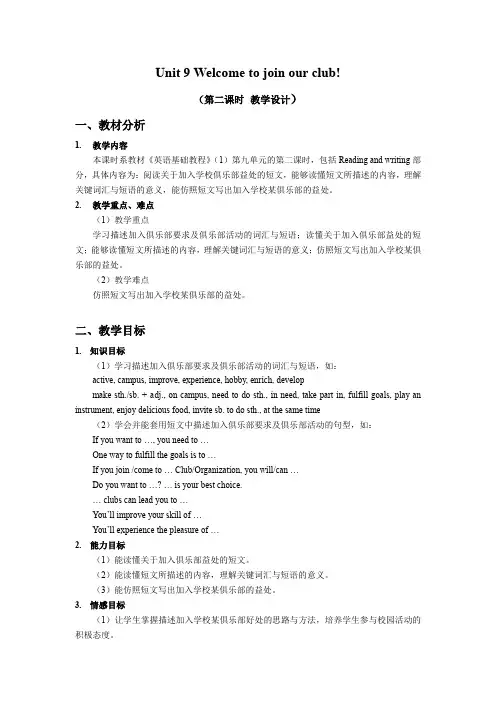
Unit 9 Welcome to join our club!(第二课时教学设计)一、教材分析1.教学内容本课时系教材《英语基础教程》(1)第九单元的第二课时,包括Reading and writing部分,具体内容为:阅读关于加入学校俱乐部益处的短文,能够读懂短文所描述的内容,理解关键词汇与短语的意义,能仿照短文写出加入学校某俱乐部的益处。
2.教学重点、难点(1)教学重点学习描述加入俱乐部要求及俱乐部活动的词汇与短语;读懂关于加入俱乐部益处的短文;能够读懂短文所描述的内容,理解关键词汇与短语的意义;仿照短文写出加入学校某俱乐部的益处。
(2)教学难点仿照短文写出加入学校某俱乐部的益处。
二、教学目标1.知识目标(1)学习描述加入俱乐部要求及俱乐部活动的词汇与短语,如:active, campus, improve, experience, hobby, enrich, developmake sth./sb. + adj., on campus, need to do sth., in need, take part in, fulfill goals, play an instrument, enjoy delicious food, invite sb. to do sth., at the same time(2)学会并能套用短文中描述加入俱乐部要求及俱乐部活动的句型,如:If you want to …, you need to …One way to fulfill the goals is to …If you join /come to … Club/Organization, you will/can …Do you want to …? … is your bes t choice.… clubs can lead you to …You’ll improve your skill of …You’ll experience the pleasure of …2.能力目标(1)能读懂关于加入俱乐部益处的短文。
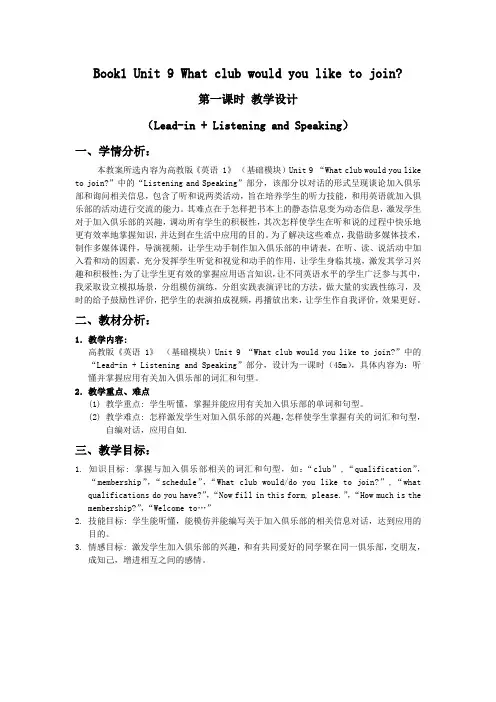
Book1 Unit 9 What club would you like to join?第一课时教学设计(Lead-in + Listening and Speaking)一、学情分析:本教案所选内容为高教版《英语 1》(基础模块)Unit 9 “What club would you like to join?”中的“Listening and Speaking”部分,该部分以对话的形式呈现谈论加入俱乐部和询问相关信息,包含了听和说两类活动,旨在培养学生的听力技能,和用英语就加入俱乐部的活动进行交流的能力。
其难点在于怎样把书本上的静态信息变为动态信息,激发学生对于加入俱乐部的兴趣,调动所有学生的积极性,其次怎样使学生在听和说的过程中快乐地更有效率地掌握知识,并达到在生活中应用的目的。
为了解决这些难点,我借助多媒体技术,制作多媒体课件,导演视频,让学生动手制作加入俱乐部的申请表,在听、读、说活动中加入看和动的因素,充分发挥学生听觉和视觉和动手的作用,让学生身临其境,激发其学习兴趣和积极性;为了让学生更有效的掌握应用语言知识,让不同英语水平的学生广泛参与其中,我采取设立模拟场景,分组模仿演练,分组实践表演评比的方法,做大量的实践性练习,及时的给予鼓励性评价,把学生的表演拍成视频,再播放出来,让学生作自我评价,效果更好。
二、教材分析:1.教学内容:高教版《英语 1》(基础模块)Unit 9 “What club would you like to join?”中的“Lead-in + Listening and Speaking”部分,设计为一课时(45m),具体内容为:听懂并掌握应用有关加入俱乐部的词汇和句型。
2.教学重点、难点(1)教学重点: 学生听懂,掌握并能应用有关加入俱乐部的单词和句型。
(2)教学难点: 怎样激发学生对加入俱乐部的兴趣,怎样使学生掌握有关的词汇和句型,自编对话,应用自如.三、教学目标:1. 知识目标: 掌握与加入俱乐部相关的词汇和句型,如:“club”,“qualification”,“membership”,“schedule”,“What club would/do you like to join?”,“what qualifications do you have?”,“Now fill in this form, please.”,“How much is the membership?”,“Welcome to…”2. 技能目标: 学生能听懂,能模仿并能编写关于加入俱乐部的相关信息对话,达到应用的目的。
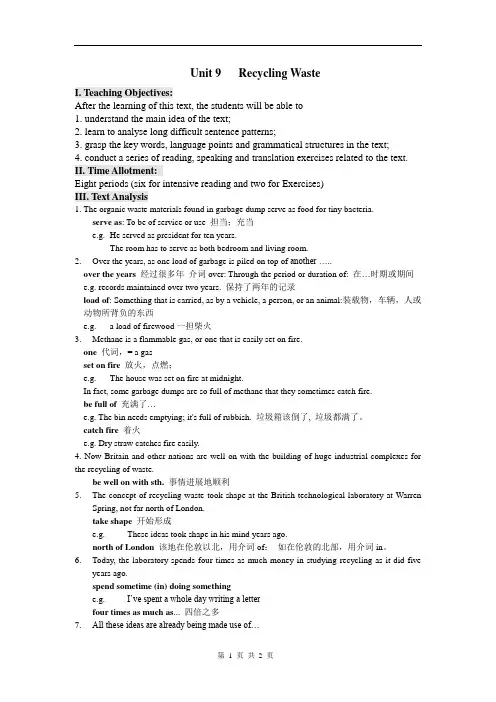
Unit 9 Recycling WasteI. Teaching Objectives:After the learning of this text, the students will be able to1. understand the main idea of the text;2. learn to analyse long difficult sentence patterns;3. grasp the key words, language points and grammatical structures in the text;4. conduct a series of reading, speaking and translation exercises related to the text. II. Time Allotment:Eight periods (six for intensive reading and two for Exercises)III. Text Analysis1. The organic waste materials found in garbage dump serve as food for tiny bacteria.serve as: To be of service or use 担当;充当e.g. He served as president for ten years.The room has to serve as both bedroom and living room.2. Over the years, as one load of garbage is piled on top of another …..over the years经过很多年介词over: Through the period or duration of: 在…时期或期间e.g. records maintained over two years. 保持了两年的记录load of: Something that is carried, as by a vehicle, a person, or an animal:装载物,车辆,人或动物所背负的东西e.g. a load of firewood一担柴火3. Methane is a flammable gas, or one that is easily set on fire.one代词,= a gasset on fire放火,点燃;e.g. The house was set on fire at midnight.In fact, some garbage dumps are so full of methane that they sometimes catch fire.be full of充满了…e.g. The bin needs emptying; it's full of rubbish. 垃圾箱该倒了, 垃圾都满了。
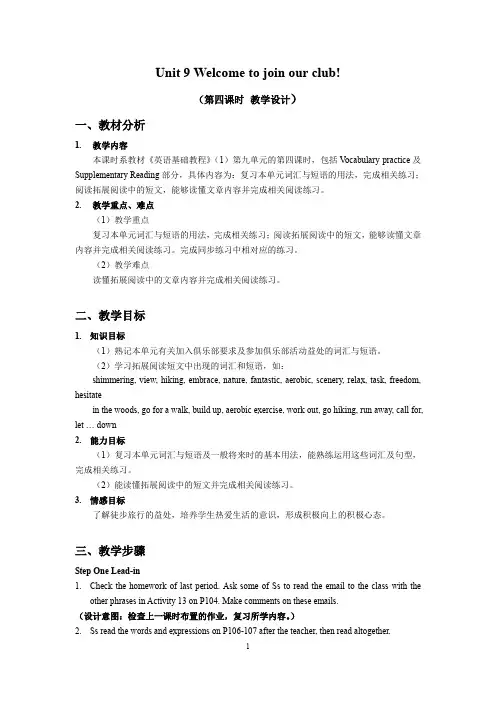
Unit 9 Welcome to join our club!(第四课时教学设计)一、教材分析1.教学内容本课时系教材《英语基础教程》(1)第九单元的第四课时,包括V ocabulary practice及Supplementary Reading部分,具体内容为:复习本单元词汇与短语的用法,完成相关练习;阅读拓展阅读中的短文,能够读懂文章内容并完成相关阅读练习。
2.教学重点、难点(1)教学重点复习本单元词汇与短语的用法,完成相关练习;阅读拓展阅读中的短文,能够读懂文章内容并完成相关阅读练习。
完成同步练习中相对应的练习。
(2)教学难点读懂拓展阅读中的文章内容并完成相关阅读练习。
二、教学目标1.知识目标(1)熟记本单元有关加入俱乐部要求及参加俱乐部活动益处的词汇与短语。
(2)学习拓展阅读短文中出现的词汇和短语,如:shimmering, view, hiking, embrace, nature, fantastic, aerobic, scenery, relax, task, freedom, hesitatein the woods, go for a walk, build up, aerobic exercise, work out, go hiking, run away, call for, let … down2.能力目标(1)复习本单元词汇与短语及一般将来时的基本用法,能熟练运用这些词汇及句型,完成相关练习。
(2)能读懂拓展阅读中的短文并完成相关阅读练习。
3.情感目标了解徒步旅行的益处,培养学生热爱生活的意识,形成积极向上的积极心态。
三、教学步骤Step One Lead-in1.Check the homework of last period. Ask some of Ss to read the email to the class with theother phrases in Activity 13 on P104. Make comments on these emails.(设计意图:检查上一课时布置的作业,复习所学内容。
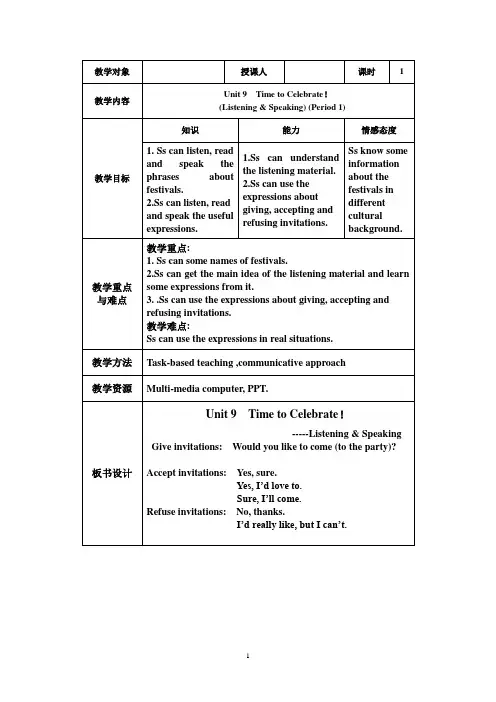
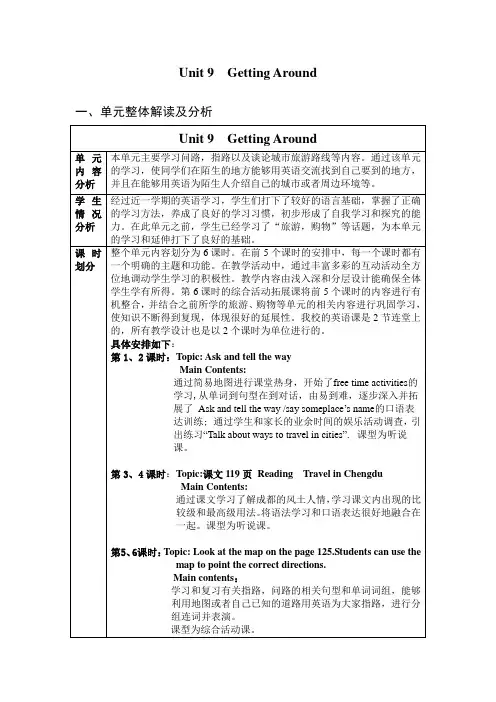
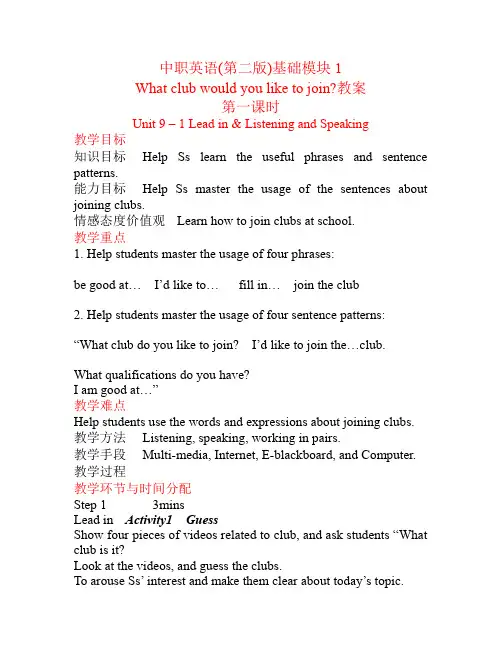
中职英语(第二版)基础模块1What club would you like to join?教案第一课时Unit 9 – 1 Lead in & Listening and Speaking教学目标知识目标Help Ss learn the useful phrases and sentence patterns.能力目标Help Ss master the usage of the sentences about joining clubs.情感态度价值观Learn how to join clubs at school.教学重点1. Help students master the usage of four phrases:be good at… I’d like to… fill in… join the club2. Help students master the usage of four sentence patterns: “What club do you like to join? I’d like to join the…club.What qualifications do you have?I am good at…”教学难点Help students use the words and expressions about joining clubs. 教学方法Listening, speaking, working in pairs.教学手段Multi-media, Internet, E-blackboard, and Computer.教学过程教学环节与时间分配Step 1 3minsLead in Activity1 GuessShow four pieces of videos related to club, and ask students “What club is it?Look at the videos, and guess the clubs.To arouse Ss’ interest and make them clear about today’s topic.Step 2 10minsPre-listening Activity 2 Match1Ask Ss to match the new words according to the pictures. Activity 3 Learn2Lead Ss to learn and match the new phrases, and then check the answers.Activity 4 Finish3Lead students to finish the blanks according to the pictures. Match, learn and read the new words after teacher.Step 3 15minsWhile-listeningPlay the tape, lead Ss to finish two kinds of listening training :Activity 5 Listen1Listen and complete2Listen and chooseListen to the tape and finish two kinds of listening exercises with the help of teacher.Step4 Post –Listening 10minsActivity6 Read1Ask Ss to read after teacher.2Ask Ss to read in pairs3Ask Ss to read in groupsActivity7 Drill1Ask Ss to Finish the application forms according to the pictures and information in groups.2Lead Ss to do the substitution drills according to the outline. Step 5 Role PlayActivity8 Role playCreate situation, and ask the Ss to finish the task according to the requirements, and then ask each group to perform their Club Interview.Step 6 .Group Assessment & Self-check 5minsActivity9 Assessment1. Group AssessmentAsk Ss to give each group a score according to the standard, and choose “The Best Group”.2. Self-checkAsk Ss to give themselves a score according to the contents in the sheet. Read the Assessment sheet and evaluate each group, and then pick out “The Best Group”Step 7 Homework2minsWrite down an Art Club Interview dialogue with at least 10 sentences by using the key patterns.Shoot a short video about the Art Club Interview, and upload to the BB Platform.板书设计Unit 9. What club would you like to join?Key phrases: Key structures:be good at What club do you like to join?I’d like to I’d like to join the…club.fill in What qualifications do you have?join the club I am good at…第二课时Unit 9 – 2 Reading and writing教学目标知识目标Help Ss understand the words and expression in posters能力目标Help Ss understand the main ideas of posters情感态度价值观Join the clubs and be active教学重点Understand the structures and expressions about joining a club.教学难点Suggest a proper clubs with useful expressions according to the given situation.教学方法Reading, writing, discussing, working in groups.教学手段Multi-media, blackboard.教学过程教学环节与时间分配Step 1 3minsLead in Activity1 GuessShow four pieces of videos related to club, and ask students “What club is it?Step 2 8minsPre-listening Activity 2 MatchAsk Ss to match the new words according to the pictures. Activity 3 LearnLead Ss to learn and match the new phrases, and then check the answers.Activity 4 FinishLead students to finish the blanks according to the pictures. Step 3 15minsWhile-listeningPlay the tape, Lead Ss to finish two kinds of listening training :Activity 5 Listen1.Listen and complete2.Listen and chooseStep4 Post – Listening 10minsActivity6 Read1.Ask Ss to read after teacher.2.Ask Ss to read in pairs3.Ask Ss to read in groupsActivity7 Drill1.Ask Ss to Finish the application forms according to thepictures and information in groups.2.Lead Ss to do the substitution drills according to the outline. Step 5 Role Play 5minsActivity8 Role playCreate situation, and ask the Ss to finish the task according to the requirements, and then ask each group to perform their ClubInterview.Step 6.Group Assessment &Self-check 3minsActivity9 Assessment1. Group AssessmentAsk Ss to give each group a score according to the standard, and choose “The Best Group”.2. Self-checkAsk Ss to give themselves a score according to the contents in the sheet.Step 7 Homework1min1.Write down an Art Club Interview dialogue with at least 10 sentences by using the key patterns.2.Shoot a short video about the Art Club Interview, and upload to the BB Platform.板书设计Unit 9. What club would you like to join?Key phrases: Key structures:be good at What club do you like to join?I’d like to I’d like to join the…club.fill in What qualifications do you have?join the club I am good at…第三课时Unit 9 – 3 Language in use & Unit Task教学目标知识目标1.Help Ss learn the simple future tense: will/be going to2.Help Ss review the key parts in this unit能力目标1. Help Ss master the usage of the simple future tense2. Help Ss set up a club with group members.情感态度价值观Learn to express ideas and cooperate with other classmates教学重点1. Learn the sentence structures of will/be going to2. Understand the usage of the simple future tense教学难点1. Use will/be going to sentences correctly2. Express the future plans by using will/be going to sentences教学方法Discussing, working in group教学手段Multi-media, blackboard教学过程教学环节与时间分配Step 1 3minsLead in1) Shows a video show, ask the Ss to tick the right ones.2) Check the key.3) Group feedback.Step 2 12minsPresentation•She will sing English songs.•She will listen to English music.•She will watch English TV programs.Ask the Ss to find out the same structure in these sentences.→will + 动词原形do描述将来发生的事情•She will watch English TV programs.•I/You/She/He/It/We/You/They will watchEnglish TV programs.Will I/you/she/he/we/you/they watch EnglishTV programs?→will +主语+ 动词原形do …?What will you/he/she/they do in the club?- I / We/ He / She /They will …→ Wh-/H-(特殊疑问词)+ 主语+ do…?常见的时间状语:next week/year tomorrowthe coming Monday tonightthis afternoon in the futurein a few minutes in five years对比句型I will/shall join the English club.I am going to join the English club.She/He is going to join the English club.We /They are going to join the English club.be (am is are) going to do计划、打算做某事-Be (Am Is Are) + 主语+going to do…?-Yes, 主语+ be (am is are).-No, 主语+ be (am is are) +not.Wh-/H-(特殊疑问词)+主语+going to do?Step 3 Practice15minsActivity 1Ask Ss to fill in blanks.Activity 2Ask Ss to do pair-works with the given pictures and clued phrases. Activity 3Ask Ss to make short new dialogues with the flash pictures.Step 4 Unit task 10minsAsk Ss to list the names of clubs and qulifications of members. Do the interviews in groups.Step 5 Consolidation 3minsSummarize the sentence structures and usage of will/be going to together.Step 6 Homework 2mins1. Finish off the grammar exercises on WB P67 Ex 5; P69 Ex 92. Design their future plans on computer.板书设计Unit 9 The Simple Future Tensewill/ be going to。
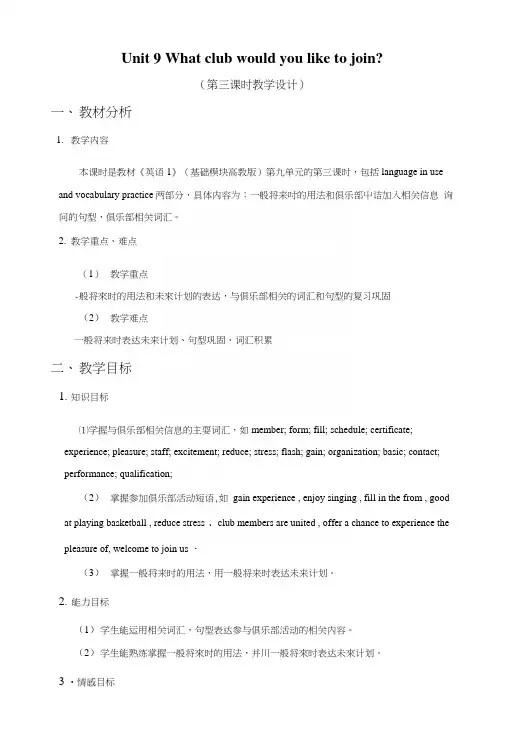
Unit 9 What club would you like to join?(第三课时教学设计)一、教材分析1.教学内容本课时是教材《英语1》(基础模块高教版)第九单元的第三课时,包括language in use and vocabulary practice两部分,具体内容为:一般将来吋的用法和俱乐部屮诘加入相关信息询问的句型,俱乐部相关词汇。
2.教学重点、难点(1)教学重点-般将來时的用法和未來计划的表达,与俱乐部相关的词汇和句型的复习巩固(2)教学难点一般将来时表达未来计划、句型巩固、词汇积累二、教学目标1.知识目标⑴学握与俱乐部相关信息的主耍词汇,如member; form; fill; schedule; certificate;experience; pleasure; staff; excitement; reduce; stress; flash; gain; organization; basic; contact;performance; qualification;(2)掌握参加俱乐部活动短语,如gain experience , enjoy singing , fill in the from , good at playing basketball , reduce stress 、club members are united , offer a chance to experience the pleasure of, welcome to join us ・(3)掌握一般将来时的用法,用一般将来时表达未来计划。
2.能力目标(1)学生能运用相关词汇,句型表达参与俱乐部活动的相关内容。
(2)学生能熟练掌握一般将來时的用法,并川一般将來时表达未來计划。
3 •情感目标学生能根据口己的梦想,制定未来的计划,树立学习的冃标。
三、教学步骤Step one Lead-in (6m)1.Have a comment on the students9 poster. Show some beautiful posters in class・(设计意图:及时评价学生作业,肯定优秀作品,促使学生的学习积极性的提高)2.Have students think about what they will do in the English club and give possible answers. Find out the same structure in these sentences・ They are used to express future activities.English club We will sing English songs・We will listen to English music.We will watch English movies.We will watch English TV programs.We will play English games・We will read English magazines・We will have a competition for English speech・(设计意图:由简单的活动阐述将来会发生的事,对将来事情的主观臆断是将来时态的一种用法之一:Will+动词原形do)Step Two language in use (20m)3.Contrast: give students 4 groups of sentences, then have students talk about the similarities.(1 )What club do you join?What club are you going to join?(2)Tom work in the hospital.Tom is going to work in the hospital.(3)1 do my homework after class. | 〉be going to do (表将来)fm going to do my homework after class ・(4)It rains.It is going to rain.(设计意图:通过内容相同,时态不同的句子相互比较,对比鲜明,学生容易区别其不同之处,掌握一般将来时态的第二种表达be(am is are)going to do,也是计划打算做的事情即将来时态的第二种用法)4.Activity 19 Talk and write: Have students talk about three things they will do after class. Then exchange ideas with their partner.(l)Will you watch TV after class?Yes, I will. / No, I worT匸IT1 do my homework.What are you going to do after class?First, I will---/Fm going to…Next, I will・・・/I'm going to…Then, I will…/IF going to…(2)What is he/she going to do after class?He/she is going lo…(3)What are they going to do after class?They are going to…(4)What will you/he/she/they do after class?I/We/ He / She /They will ...Will you/he/she/they ...?Yes, I/we/he/she/they will.No, I/we/he/she/they wont(设计意图:通过归纳与对比,加深学生印象,使知识结构清晰,便于学生掌握。
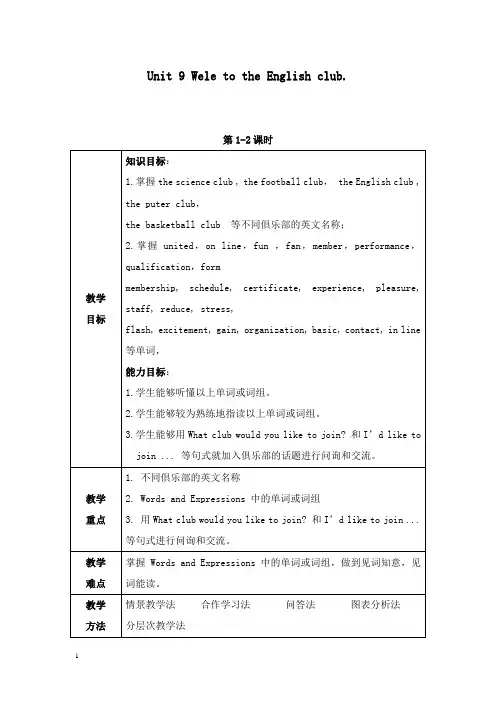
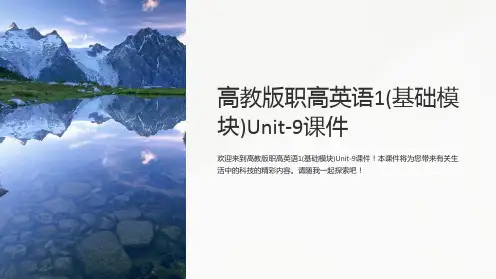
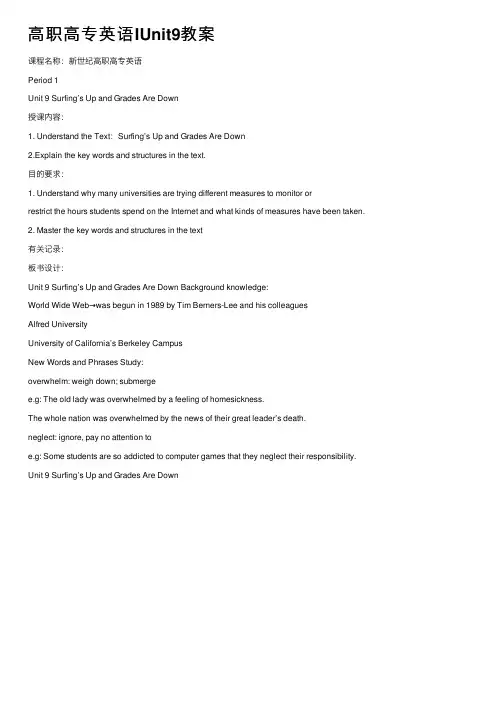
⾼职⾼专英语IUnit9教案课程名称:新世纪⾼职⾼专英语Period 1Unit 9 Surfing’s Up and Grades Are Down授课内容:1. Understand the Text:Surfing’s Up and Grades Are Down2.Explain the key words and structures in the text.⽬的要求:1. Understand why many universities are trying different measures to monitor orrestrict the hours students spend on the Internet and what kinds of measures have been taken.2. Master the key words and structures in the text有关记录:板书设计:Unit 9 Surfing’s Up and Grades Are Down Background knowledge:World Wide Web→was begun in 1989 by Tim Berners-Lee and his colleaguesAlfred UniversityUniversity of California’s Berkeley CampusNew Words and Phrases Study:overwhelm: weigh down; submergee.g: The old lady was overwhelmed by a feeling of homesickness.The whole nation was overwhelmed by the news of their great leader’s death.neglect: ignore, pay no attention toe.g: Some students are so addicted to computer games that they neglect their responsibility. Unit 9 Surfing’s Up and Grades Are DownI.Lead in( 15 minutes)Ask the students to discuss in pairs their opinions on computers and then ask some pairs to tell their opinions to the whole class.Q1: Do you agree that we are now living in the age of information and the Internet happens to be the most important source of information? Why?A: I agree. Because from many aspects, we can see how the Internet influences our lives by providing us with the information everyday. For example, at home….., at school…..Q2. What are the strong points of using computers and the Internet?A: With the help of computers and the Internet, we can get a great deal of information very quickly and conveniently.Q3. What about the weak points?A: Some people may get addicted to computer games and lose themselves in the Internet, so they may forget their responsibilities in real lives.II. Read in ( 65 minutes)1. Background Information ( 5 minutes)1) World Wide webThe WEB has become the leading information retrieval service of the Internet (the world-wide computer network). The Web gives users access to a vast array of documents that are connected to each other by means of hypertext or hypermedia links.The Web operat es within the Internet’s basic client-server format; servers are computer programs that store and transmit documents to other computers on the network when asked to, while clients are programs that request documents from a server as the user asks for them. Browser software allowsusers to view the retrieved documents.2) Tim Berners-LeeA graduate of Oxford University, England, Tim now holds the 3Com Founders chair at the Laboratory for Computer Science and Artificial Intelligence Lab (CSAIL) at the Massachusetts Institute of Technology (MIT). He directs the World Wide Web Consortium, an open forum of companies and organizations with the mission to lead the Web to its full potential.With a background of system design in real-time communications and text processing software development, in 1989 he invented the World Wide Web, Internet, an Internet-based hypermedia initiative for global information sharing, while working at CERN, the European Particle Physics Laboratory. He wrote the first web client (browser-editor) and server in 1990. He is the author of Weaving the Web, on the past, present and future of the Web.3) Alfred UniversityAlfred University is one of the most respected small universities in New York State and the nation, with colleges offering individualized academic programs in liberal arts and science, engineering, business, art and design.4) University of California’s Berkeley CampusBerkeley is the oldest campus of the University of California, situated in Berkeley, California on the east side of the San Francisco Bay, overlooking the Golden Gate. There are over 33,000 students enrolled and over 1,800 faculty.2. Developing vocabulary (30 minutes)1)counselor n.someone whose job is to help and support people with problems; advisore.g.: If you have any problems concerning your studies, you are suggested to turn to a counselor for advice. Extended words: counseling, counsel2) overwhelm v. weigh down; submergee.g. The Southeast Asian nations were overwhelmed by a Tsunami strike in December 2004.Extended words: overwhelming, overwhelminglyRelated words:conquer, overcome3)impose (on) v. place (sth. unwelcome or unpleasant) on sb./sth.; inflict sth.e.g. impose restrictions, limitations, restraints, etc. on tradeExtended words: imposing, imposingly, impositionRelated words: impress, enforce4) excessive adj. greater than what is normal or necessary; extremee.g. She died of excessive alcoholic drinking.e.g. Excessive cutting of trees has resulted in environmental deterioration.Extended words: excess, excessivelyRelated words: plentiful, abundant, extra5) orientation n. activity of orienting oneself; state of being orientatede.g. Universities usually give an orientation course to the freshmen so as to help them adapt to the new college life. Extended words:orient, oriental, orientate, disorientate, orientated6) pose v.cause sth. to arise, create or presente.g. Air pollution and traffic jam pose big problems for city planning.e.g. Terrorism poses a new problem for the security of the tourists in that city.7) neglect v.1) give no or not enough care or attention to (sb./sth.)e.g. As a mother, she will never neglect her duty to take care of her kids.2) fail or forget to do sth. esp. carelessly; leave undone (what one ought to do)e.g. He neglected to lock the door when he left the office.e.g. Some of the college students have become so absorbed in new computer games that they have neglected their coursework.Extended words: neglectful, neglected8) keep a close eye on: watch closelye.g. You need to keep a close eye on your suitcase when you travel around the country.9) move n. a step in a course of action towards a particular resulte.g. The company has taken a decisive move in the face of crisis.10) monitor v.1) make continuous observation of (sth.); record or test the operation of (sth.)e.g. After the patient underwent the operation, his lungs and heart condition was monitored by a machine.2) listen to and report on (foreign radio broadcasts and signals)e.g. He stayed up all night monitoring the radio signals across the coastline.11) lose oneself in sth.: be so involved in something that one does not notice anything elsee.g. The tourists had lost themselves so much in the beauty of the scenery there that they didn’t realize the danger of the impending storm.12)have…in common: share together or equallye.g. Though they are twin brothers, they have few interests in common.3.Detail study of the text (30 minutes)Paragraph One1) Comprehension QuestionsQ: What’s the problem put forward in this paragraph?A:More and more students are overwhelmed by computers.2) Main ideaIntroducing the problem of computers taking over college students’ lives.3) Phraseside effect: an unexpected or unpleasant result of a situation or evente.g. We shouldn’t ignore the negative side effect of the BBS.4) Difficult sentencesA growing number of students are letting computers overwhelm their lives.More and more students are having their lives controlled by computers.More and more students are losing themselves in this.More and more students are getting addicted to the use of computers.Paragraph Two1) Comprehension QuestionsQ: What do the counselors say about the way students use computers?A:They say that the students put too much emphasis on electronic relationships and neglect course work.2) Main ideaStudents put too much emphasis on electronic relationships and neglect course work and some even have been cheated out of money by virtual friends.Paragraph Three1) Comprehension QuestionsQ: Why is the Internet so attractive to students according to campus officials?A: Because it opens a door to a vast new realm of learning and research.2) Main ideaInternet is attractive to students because it is a safe and easy to communicate through Internet.3) Sentence structurehave trouble (in) doing something: have difficulty (in) doing somethinge.g. The old lady had trouble remembering the combination lock code.4) Difficult sentencesBut for students having trouble establishing social ties at large universities, or who are on their own, unsupervised, and facing adult pressures for the first time, it also poses many new risks.But for students who have difficulty forming social relationships at big universities, or are now living away from their parents for supervision and suffering from adult pressures as university students, the excessive use of computers causes many new risks.Paragraph Four1) Comprehension QuestionsQ: What has been done by some universities concerning the problem mentioned in the second paragraph?A: Some universities are restricting the time students spend on campus computers.2) Main ideaUniversities are taking different measures to solve the problems mentioned.Paragraph Five and Six1) Comprehension QuestionsQ: What did Alfred University decide to examine?A: It decided to examine what common features the students who had dropped out lastsemester had.Q: What did Connie Bechman find out?A: She discovered half of the students who dropped out spent as much as six hours a day on computer games or the Web.2) Main ideaAlfred University examined the common features of the students who had dropped out last semester and found that half of them spent too much time on computer games or the Web.3) Phrasesdrop out: stop attending or taking parte.g. The young man dropped out of college to go into business.Paragraph Seven1) Comprehension QuestionsQ: What will Alfred do to the freshmen the next semester?A: The freshmen will be told about the dangers of heavy computer use immediately after they enter school.2) Main ideaFreshmen in Alfred University will be told about the danger of heavy computer use and a full-time, professional counselor will be assigned to each computer room to watch for late night computer addicts.III. Exercise ( 10 minutes)Practice Ex. IIV. Assignments1.Review the text and the key words/phrases2.Finish off Ex. II – Ex. VI3.Preview Grammar; Reading skills; Practical reading and writingPeriod 1Period 2Unit 9 Surfing’s Up and Grades Are Down授课内容:1. Grammar: Emphasis2. Reading skills: Predicting3. Practical Reading: Reading an E-commerce Website4. Practical Writing: On-line Booking and Registration⽬的要求:1. Master the use of emphasis2. Master the reading skill:Using accurate predictions while reading.3. Learn how to read e-commerce websites.4. Learn how to book and register on line.有关记录:板书设计:Unit 9 Surfing’s Up and Grades Are Down Grammar – EmphasisI.Review the text (15 minutes)1.Check the assignments2.Summarize the textColleges across America are now alarmed to see their students increasingly obsessed with computers while neglecting their course work. In order to bring these students back to their study from online activities like computer games, chatting etc., colleges are now taking preventive measures. Such measures include limiting students on computer hours, programming warnings on computer screens, creating workshops on the use of computers, and even involving the subject in orientation courses.At the University of California’s Berkeley campus, students are so addicted to cyber relationships that they forget their learning or in some cases, even get cheated out of money. It is really piteous that they feel lonely on the vast campus and consider the World Wide Web as the only safe connection to the world. And according to an examination of the dropouts made at Alfred University, the dropouts are found to have the common feature of excessive logging in, particularly late at night.Having realized the negative impact campus computers could have on students in their course work, American universities are now working to change the situation. Alfred University, for instance, has planned to warn the incoming freshmen of the dangers of excessive use of computers and keep a close watch on computer addicts on campus.II. Grammar Tips –Emphasis(15 minutes)1.Note:1)⽤”It is/was…that…”句型强调原因状语从句时,引导该状语从句的关联词必须是because,不能由as, since等引导。
Unit 9 May I help you?(第二课时教学设计)一、教材分析1.教学内容本课时系教材《英语1》(基础模块高教版)第九单元的第二课时,包括reading and writing部分,具体内容为:了解服务场所,服务人员以及服务用语,读懂各种类型的单据2.教学重点、难点⑴教学重点阅读各种类型的单据。
⑵教学难点在阅读过程中正确理解并提取相关信息完成任务。
二、教学目标1.知识目标⑴掌握服务人员名称词汇,如secretary, receptionist, shop assistant, cashier, waiter, waitress, doctor, nurse⑵掌握如何用英语在不同场合提供或获得服务的句型:What’s wrong with you?I have a bad headache.Can I take your order now?Can I help you?What can I do for you?2.能力目标a)学生能读懂并提取不同单据上的相关信息;b)在日常生活中灵活应用在不同场合提供或获得服务的英语表达方式。
3.情感目标学生了解在不同的场合,针对不同对象所使用的服务语言。
三、教学步骤Step One Lead-in1. Activity 1: The students look at the pictures, identify the places and write down the names who offer services in such places.(设计意图:复习第一课时教学内容,让学生学会用英语表达服务场所及服务人员。
既巩固了词汇,又为后面的阅读活动作铺垫和准备。
)2. The teacher brainstorms more places where services are provided and the people who serve others. The teacher may also ask the students where they will work after graduation and what they will do.(设计意图:这个活动是一个开放练习,教师要鼓励学生充分发挥想像力来丰富语境,并借此补充相关的词汇。
Unit9 What club would you like to join?(第二课时教学设计)一、教材分析1.教学内容本课时系教材《英语1》(基础模块高教版)第九单元的第二课时,包括reading and writing,具体内容为:阅读海报,读懂并练习俱乐部招新对语,读懂有关介绍俱乐部活动的宣传内容,写出加入俱乐部的理由。
2.教学重点、难点(1)教学重点练习俱乐部招新对语,读懂宣传海报,写出加入俱乐部理由。
(2)教学难点招新对语,加入俱乐部理由。
二、教学目标1.知识目标(1)掌握加入俱乐部与海报宣传的词汇,如:flash; membership; experience; staff; reduce; stress; schedule; qualification; offer; fill; performance; contact; fee; gain; excitement;(2) Understand the information in the advertisement.(3) Write the reasons of joining clubs.2.能力目标(1)学生能掌握询问俱乐部信息的语句。
(2)学生能提高阅读水平,培养获取信息的能力。
(3)学生能用所学英语有条理的表述加入俱乐部的理由。
3.情感目标学生能根据自己的能力特长,选择自己喜欢做或能做得好的事情,扬长避短,丰富自己的业余生活,增强学习的乐趣。
三、教学步骤Step One Lead-in(8m)1. The teacher greets the class and asks some detailed questions concerning what they learnedyesterday.What club would you like to join?What qualifications do you have?By the way, how much is the membership?Where can I get the schedule of the club?May I bring my friends to the club?(设计意图:复习第一课时教学内容,让学生回顾所学,表达信息,锻炼口语表达)2. Demonstrate their dialogues.Invite several groups to give their performance of applying for clubs before class. The teacher will just give a general assessment.(设计意图:考察学生课后作业,逐渐进入话题根据学习的反馈情况,以赏识教育为主,激励学生,努力提高学生学习英语的兴趣)Step two Reading (25m)3. Read advertisements.(1)Activity 13 Read and tick: Read the advertisements quickly and tick the names of club mentioned.(设计意图:根据海报培养阅读能力,查找信息,明确海报设计的要素)(2)Activity 14 Read and complete: Read the advertisements again and complete the above table according to the given information. Make sure that all the students understand the detailed information. Analyze difficult points when necessary.experience u.n.&v. Experience the excitement of making flash all by yourself.enjoy vt. enjoy doing sth.have a good chance to do sth.be interested in sth.with the help of our staffreduce your stress.make life easiergain working experiences(设计意图:明确信息内容,读懂信息内容,将信息归类;通过表格的填写,学习做笔记;解释语言点,帮助学生理解已达到灵活运用的目的)(3)Activity 15 Read and choose: Read four persons’ individual information and help them find proper clubs from the above posters.(设计意图:通过在阅读过程中快速查找关键词、句来获取所需信息,利用信息配对)4. Activity 16 Think and write:Read the posters again. Choose two clubs that you are interested in .Then write at least two sentences for each club to state the reasons why you want to join them. Students can also state the reasons for joining other clubs.Clubs Your Reasons( ) A. Health Club __________________________________________( ) B. Cooking Club __________________________________________ ( ) C. Computer Club __________________________________________ ( ) D. V olunteer Organization _____________________________________ (设计意图:用英语表达自己的想法,锻炼学生的表达能力)Step Three: language explanation and production(10m)5. Activity 17 Talk and decide:Talk with other members of the group and find out the most popular club. The reasons for their choice are required.(设计意图: 学会交流意见或想法,培养小组合作意识;学会用归纳法获取必要信息)6. Write a short paragraph for your club as the content of advertisement.You can take the following information into consideration. Design a poster with partners after class.NameQualificationsActivitiesTimePlaceTelephone numbere-mail(设计意图:请学生为自己感兴趣的俱乐部设计海报广告语,引发学生学习兴趣.教师事先收集一些英文海报广告词.阅读上面的信息,给学生一个直观的范本,鼓励学生大胆创新)Step Four Homework (2m)1.Copy words: united; online; fun; fan; performance; member; qualification; form; membership;schedule; certificate; experience; pleasure; staff; reduce; stress; flash; excitement; gain;organization; basic; in line;2.Design a poster for your club.3.Do the exercises in the workbook.四.Blackboard DesignUnit9 What club would you like to join?Clubs Your ReasonsHealth Club ----------------------------------- experience: v/nCooking Club ------------------------------------ enjoy doingComputer Club ------------------------------------ have a good chance to do sth V olunteer Organization ---------------------------- be interested in doing sthwith the help of宁波市宁海县第一职业中学王亚秋2009年11月。
课程名称:新世纪高职高专英语Period 1Unit 9 Surfing’s Up and Grades Are Down授课内容:1. Understand the Text:Surfing’s Up and Grades Are Down2.Explain the key words and structures in the text.目的要求:1. Understand why many universities are trying different measures to monitor orrestrict the hours students spend on the Internet and what kinds of measures have been taken.2. Master the key words and structures in the text有关记录:板书设计:Unit 9 Surfing’s Up and Grades Are Down Background knowledge:World Wide Web→was begun in 1989 by Tim Berners-Lee and his colleaguesAlfred UniversityUniversity of California’s Berkeley CampusNew Words and Phrases Study:overwhelm: weigh down; submergee.g: The old lady was overwhelmed by a feeling of homesickness.The whole nation was overwhelmed by the news of their great leader’s death.neglect: ignore, pay no attention toe.g: Some students are so addicted to computer games that they neglect their responsibility.Unit 9 Surfing’s Up and Grades Are DownI.Lead in( 15 minutes)Ask the students to discuss in pairs their opinions on computers and then ask some pairs to tell their opinions to the whole class.Q1: Do you agree that we are now living in the age of information and the Internet happens to be the most important source of information? Why?A: I agree. Because from many aspects, we can see how the Internet influences our lives by providing us with the information everyday. For example, at home….., at school…..Q2. What are the strong points of using computers and the Internet?A: With the help of computers and the Internet, we can get a great deal of information very quickly and conveniently.Q3. What about the weak points?A: Some people may get addicted to computer games and lose themselves in the Internet, so they may forget their responsibilities in real lives.II. Read in ( 65 minutes)1. Background Information ( 5 minutes)1) World Wide webThe WEB has become the leading information retrieval service of the Internet (the world-wide computer network). The Web gives users access to a vast array of documents that are connected to each other by means of hypertext or hypermedia links.The Web operat es within the Internet’s basic client-server format; servers are computer programs that store and transmit documents to other computers on the network when asked to, while clients are programs that request documents from a server as the user asks for them. Browser software allowsusers to view the retrieved documents.2) Tim Berners-LeeA graduate of Oxford University, England, Tim now holds the 3Com Founders chair at the Laboratory for Computer Science and Artificial Intelligence Lab (CSAIL) at the Massachusetts Institute of Technology (MIT). He directs the World Wide Web Consortium, an open forum of companies and organizations with the mission to lead the Web to its full potential.With a background of system design in real-time communications and text processing software development, in 1989 he invented the World Wide Web, Internet, an Internet-based hypermedia initiative for global information sharing, while working at CERN, the European Particle Physics Laboratory. He wrote the first web client (browser-editor) and server in 1990. He is the author of Weaving the Web, on the past, present and future of the Web.3) Alfred UniversityAlfred University is one of the most respected small universities in New York State and the nation, with colleges offering individualized academic programs in liberal arts and science, engineering, business, art and design.4) University of California’s Berkeley CampusBerkeley is the oldest campus of the University of California, situated in Berkeley, California on the east side of the San Francisco Bay, overlooking the Golden Gate. There are over 33,000 students enrolled and over 1,800 faculty.2. Developing vocabulary (30 minutes)1)counselor n.someone whose job is to help and support people with problems; advisore.g.: If you have any problems concerning your studies, you are suggested to turn to a counselor for advice.Extended words: counseling, counsel2) overwhelm v. weigh down; submergee.g. The Southeast Asian nations were overwhelmed by a Tsunami strike in December 2004.Extended words: overwhelming, overwhelminglyRelated words:conquer, overcome3)impose (on) v. place (sth. unwelcome or unpleasant) on sb./sth.; inflict sth.e.g. impose restrictions, limitations, restraints, etc. on tradeExtended words: imposing, imposingly, impositionRelated words: impress, enforce4) excessive adj. greater than what is normal or necessary; extremee.g. She died of excessive alcoholic drinking.e.g. Excessive cutting of trees has resulted in environmental deterioration.Extended words: excess, excessivelyRelated words: plentiful, abundant, extra5) orientation n. activity of orienting oneself; state of being orientatede.g. Universities usually give an orientation course to the freshmen so as to help them adapt to the new college life.Extended words:orient, oriental, orientate, disorientate, orientated6) pose v.cause sth. to arise, create or presente.g. Air pollution and traffic jam pose big problems for city planning.e.g. Terrorism poses a new problem for the security of the tourists in that city.7) neglect v.1) give no or not enough care or attention to (sb./sth.)e.g. As a mother, she will never neglect her duty to take care of her kids.2) fail or forget to do sth. esp. carelessly; leave undone (what one ought to do)e.g. He neglected to lock the door when he left the office.e.g. Some of the college students have become so absorbed in new computer games that they have neglected their coursework.Extended words: neglectful, neglected8) keep a close eye on: watch closelye.g. You need to keep a close eye on your suitcase when you travel around the country.9) move n. a step in a course of action towards a particular resulte.g. The company has taken a decisive move in the face of crisis.10) monitor v.1) make continuous observation of (sth.); record or test the operation of (sth.)e.g. After the patient underwent the operation, his lungs and heart condition was monitored by a machine.2) listen to and report on (foreign radio broadcasts and signals)e.g. He stayed up all night monitoring the radio signals across the coastline.11) lose oneself in sth.: be so involved in something that one does not notice anything elsee.g. The tourists had lost themselves so much in the beauty of the scenery there that they didn’t realize the danger of the impending storm.12)have…in common: share together or equallye.g. Though they are twin brothers, they have few interests in common.3.Detail study of the text (30 minutes)Paragraph One1) Comprehension QuestionsQ: What’s the problem put forward in this paragraph?A:More and more students are overwhelmed by computers.2) Main ideaIntroducing the problem of computers taking over college students’ lives.3) Phraseside effect: an unexpected or unpleasant result of a situation or evente.g. We shouldn’t ignore the negative side effect of the BBS.4) Difficult sentencesA growing number of students are letting computers overwhelm their lives.More and more students are having their lives controlled by computers.More and more students are losing themselves in this.More and more students are getting addicted to the use of computers.Paragraph Two1) Comprehension QuestionsQ: What do the counselors say about the way students use computers?A:They say that the students put too much emphasis on electronic relationships and neglect course work.2) Main ideaStudents put too much emphasis on electronic relationships and neglect course work and some even have been cheated out of money by virtual friends.Paragraph Three1) Comprehension QuestionsQ: Why is the Internet so attractive to students according to campus officials?A: Because it opens a door to a vast new realm of learning and research.2) Main ideaInternet is attractive to students because it is a safe and easy to communicate through Internet.3) Sentence structurehave trouble (in) doing something: have difficulty (in) doing somethinge.g. The old lady had trouble remembering the combination lock code.4) Difficult sentencesBut for students having trouble establishing social ties at large universities, or who are on their own, unsupervised, and facing adult pressures for the first time, it also poses many new risks.But for students who have difficulty forming social relationships at big universities, or are now living away from their parents for supervision and suffering from adult pressures as university students, the excessive use of computers causes many new risks.Paragraph Four1) Comprehension QuestionsQ: What has been done by some universities concerning the problem mentioned in the second paragraph?A: Some universities are restricting the time students spend on campus computers.2) Main ideaUniversities are taking different measures to solve the problems mentioned.Paragraph Five and Six1) Comprehension QuestionsQ: What did Alfred University decide to examine?A: It decided to examine what common features the students who had dropped out lastsemester had.Q: What did Connie Bechman find out?A: She discovered half of the students who dropped out spent as much as six hours a day on computer games or the Web.2) Main ideaAlfred University examined the common features of the students who had dropped out last semester and found that half of them spent too much time on computer games or the Web.3) Phrasesdrop out: stop attending or taking parte.g. The young man dropped out of college to go into business.Paragraph Seven1) Comprehension QuestionsQ: What will Alfred do to the freshmen the next semester?A: The freshmen will be told about the dangers of heavy computer use immediately after they enter school.2) Main ideaFreshmen in Alfred University will be told about the danger of heavy computer use and a full-time, professional counselor will be assigned to each computer room to watch for late night computer addicts.III. Exercise ( 10 minutes)Practice Ex. IIV. Assignments1.Review the text and the key words/phrases2.Finish off Ex. II – Ex. VI3.Preview Grammar; Reading skills; Practical reading and writingPeriod 1Period 2Unit 9 Surfing’s Up and Grades Are Down授课内容:1. Grammar: Emphasis2. Reading skills: Predicting3. Practical Reading: Reading an E-commerce Website4. Practical Writing: On-line Booking and Registration目的要求:1. Master the use of emphasis2. Master the reading skill:Using accurate predictions while reading.3. Learn how to read e-commerce websites.4. Learn how to book and register on line.有关记录:板书设计:Unit 9 Surfing’s Up and Grades Are Down Grammar – EmphasisI.Review the text (15 minutes)1.Check the assignments2.Summarize the textColleges across America are now alarmed to see their students increasingly obsessed with computers while neglecting their course work. In order to bring these students back to their study from online activities like computer games, chatting etc., colleges are now taking preventive measures. Such measures include limiting students on computer hours, programming warnings on computer screens, creating workshops on the use of computers, and even involving the subject in orientation courses.At the University of California’s Berkeley campus, students are so addicted to cyber relationships that they forget their learning or in some cases, even get cheated out of money. It is really piteous that they feel lonely on the vast campus and consider the World Wide Web as the only safe connection to the world. And according to an examination of the dropouts made at Alfred University, the dropouts are found to have the common feature of excessive logging in, particularly late at night.Having realized the negative impact campus computers could have on students in their course work, American universities are now working to change the situation. Alfred University, for instance, has planned to warn the incoming freshmen of the dangers of excessive use of computers and keep a close watch on computer addicts on campus.II. Grammar Tips –Emphasis(15 minutes)1.Note:1)用”It is/was…that…”句型强调原因状语从句时,引导该状语从句的关联词必须是because,不能由as, since等引导。